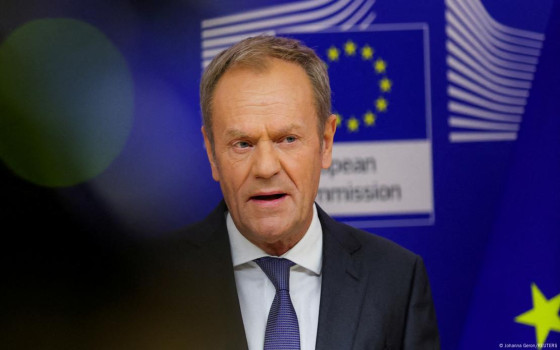
Poland takes over the presidency of the European Union at the beginning of the new year.. after the end of the nightmare of the Hungarian presidency

- Europe and Arabs
- Monday , 30 December 2024 10:51 AM GMT
Brussels - Warsaw: Europe and the Arabs
The period of Hungary's rotating presidency of the European Union during the last six months of 2024 was a nightmare, and the member states of the unified European bloc breathed a sigh of relief after a difficult period in which coordination between the rotating presidency of the Union and the member states was absent, and Budapest took steps alone without consulting the rest of the European capitals, and everyone waited for this period to end without taking any measures that might increase the gap between Brussels and Hungary under Orban's leadership.
Poland takes over the rotating presidency of the European Union from Hungary and hopes to participate in making its policies, especially with regard to security issues and Ukraine. Poland will deal with other issues such as the expansion of the European Union and the competitiveness of European companies.
In early January 2025, Poland is scheduled to assume the rotating presidency of the European Union for six months, under the slogan "Security, Europe". One of the European Union member states (27 countries) assumes the presidency of the bloc, every six months in rotation, leading political discussions. Belgium and then Hungary took over the presidency in 2024.
End of the Hungarian clash
The end of the Hungarian presidency marks the end of a turbulent six months for the EU. Instead of acting as a neutral mediator, Hungarian Prime Minister Viktor Orbán has gone on a collision course with Brussels and alienated his partners with a bizarre “peace mission.” Orbán has also made visits to Moscow, Kiev and Beijing without consulting European leaders.
Security in all its concepts and dimensions
Warsaw’s list of priorities during its presidency revolves around the concept of security – in all its dimensions – internal and external security, economic security, energy security, food security and health security. Polish Prime Minister Donald Tusk said that Warsaw will take over the European presidency in the midst of several crises – in Ukraine, Georgia and the Middle East.
According to a media report from Germany “Deutsche Welle”, Poland intends to focus on strengthening the competitiveness of European companies, especially in terms of reducing energy costs, and reducing bureaucracy and red tape. Warsaw also wants to address the issue of EU enlargement, allowing new members to join the bloc, especially from the Western Balkans.
20 years of Poland’s commitment to the system
The logo of Poland’s six-month presidency consists of the first two letters of the European Union (EU) intertwined with the country’s flag. It represents the country’s commitment to the bloc, its 20 years of membership and its ambition to set new directions. The logo was designed by renowned Polish artist Jerzy Janiszewski, who also designed the logo of the Solidarity labour movement founded in 1980 and the Council of the European Union, often referred to as the “Council.”
Tusk prepares peace plan to end the war in Ukraine
Warsaw has been busy preparing to take on the European presidency to host talks on Ukraine’s response to Russia’s full-scale invasion of the country. Prime Minister Donald Tusk said last week that he had discussed with French President Emmanuel Macron the possibility of foreign troops being stationed in Ukraine in the event of a ceasefire, but stressed that Poland had “no intention of taking such action” at the moment. Tusk also said that peace talks on the Ukraine war could begin "this winter". "The Polish presidency will be particularly responsible for what the political landscape will look like, and perhaps what the situation will look like during the (peace) negotiations," the Polish prime minister explained.
Poland, also a member of NATO, is a strong supporter of neighboring Ukraine and is a key logistics hub for Western military aid to Kiev. The Western military alliance has 32 member states.
"We need peace in Ukraine, in order to send peacekeeping missions," said EU High Representative for Foreign Affairs and Security Policy Kaja Kallas. "Before that, we have nothing to talk about. Of course, it is up to each European country to decide whether to use its forces in any operations."
A new package of sanctions against Russia?
Poland is expected to play a significant role in the Ukraine war, which will turn three in February 2025. The EU is planning to adopt the 16th package of sanctions against Russia, at the start of a conflict that is expected to be tough against Moscow and will have a significant impact on Russia. Individual EU member states are also making efforts to support Ukraine, which has sparked internal political conflicts in these countries.
Ukraine’s EU membership looming?
Following the launch of Russia’s full-scale invasion of Ukraine in February 2022, EU enlargement efforts have gained momentum, and Ukraine has made rapid progress on this path since then.
Under the Belgian presidency of the EU in the first half of 2024, the EU has agreed to the formal start of accession talks with Ukraine. The vetting process has thus begun, a process between the European Commission and the candidate country concerned, during which national legislation is assessed and areas of convergence with the bloc’s legislation, the so-called “common decisions”.
The assessment process is a prerequisite for opening the so-called groups, which always include several accession chapters. This assessment could be completed during the Polish EU Presidency, the first half of 2025.












No Comments Found